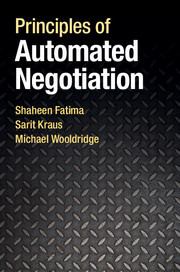Description
Principles of Automated Negotiation
Authors: Fatima Shaheen, Kraus Sarit, Wooldridge Michael
Top researchers investigate the main challenges and state of the art in automated negotiation and discuss potential applications.
Language: English
Subject for Principles of Automated Negotiation:
Approximative price 57.55 €
In Print (Delivery period: 14 days).
Add to cart
Publication date: 11-2014
289 p. · 15.6x23.5 cm · Hardback
289 p. · 15.6x23.5 cm · Hardback
Description
/li>Contents
/li>Biography
/li>
With an increasing number of applications in the context of multi-agent systems, automated negotiation is a rapidly growing area. Written by top researchers in the field, this state-of-the-art treatment of the subject explores key issues involved in the design of negotiating agents, covering strategic, heuristic, and axiomatic approaches. The authors discuss the potential benefits of automated negotiation as well as the unique challenges it poses for computer scientists and for researchers in artificial intelligence. They also consider possible applications and give readers a feel for the types of domains where automated negotiation is already being deployed. This book is ideal for graduate students and researchers in computer science who are interested in multi-agent systems. It will also appeal to negotiation researchers from disciplines such as management and business studies, psychology and economics.
List of illustrations; Preface; Summary of key notation; 1. Introduction; 2. Games in normal form; 3. Games in extensive form; 4. Negotiation domains; 5. Strategic analysis of single-issue negotiation; 6. Strategic analysis of multi-issue negotiation; 7. The negotiation agenda; 8. Multilateral negotiations; 9. Heuristic approaches; 10. Man-machine negotiations; 11. Axiomatic analysis of negotiation; 12. Applications; 13. Related topics; 14. Concluding remarks; Appendix A. Proofs; References; Index.
Shaheen Fatima is lecturer in the Department of Computer Science at Loughborough University. Her main research interests are in the study of strategic interactions and coalition formation in multi-agent systems. She has been working in the area for over 15 years and has published over 50 papers in top international conferences and journals.
Sarit Kraus is Professor of Computer Science at Bar-Ilan University, Israel and an Adjunct Professor at the University of Maryland. She has focused her research on intelligent agents and multi-agent systems. In particular, she has developed Diplomat, the first automated agent that negotiated proficiently with people. Kraus has received the EMET Prize for her expertise and contributions to artificial intelligence, the IJCAI 'Computers and Thought Award', the ACM SIGART Agents Research award, and the prestigious Advanced ERC Grant. She also received a special commendation from the city of Los Angeles, together with Professor Tambe, Professor Ordonez and their students, for the creation of the ARMOR security scheduling system.
Michael Wooldridge is Professor in the Department of Computer Science at the University of Oxford. He has been active in multi-agent systems research since 1989, and has published over 300 articles in the area. His main interests are in the use of formal methods for reasoning about autonomous agents and multi-agent systems. Wooldridge received the ACM Autonomous Agents Research Award in 2006.
Sarit Kraus is Professor of Computer Science at Bar-Ilan University, Israel and an Adjunct Professor at the University of Maryland. She has focused her research on intelligent agents and multi-agent systems. In particular, she has developed Diplomat, the first automated agent that negotiated proficiently with people. Kraus has received the EMET Prize for her expertise and contributions to artificial intelligence, the IJCAI 'Computers and Thought Award', the ACM SIGART Agents Research award, and the prestigious Advanced ERC Grant. She also received a special commendation from the city of Los Angeles, together with Professor Tambe, Professor Ordonez and their students, for the creation of the ARMOR security scheduling system.
Michael Wooldridge is Professor in the Department of Computer Science at the University of Oxford. He has been active in multi-agent systems research since 1989, and has published over 300 articles in the area. His main interests are in the use of formal methods for reasoning about autonomous agents and multi-agent systems. Wooldridge received the ACM Autonomous Agents Research Award in 2006.
© 2024 LAVOISIER S.A.S.

